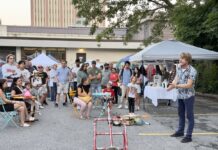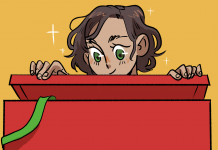The University of Waterloo has a reputation as a leader in education on the global stage. So how does the university integrate sustainability literacy into education across all faculties?
Sustainability, and more broadly, sustainable development, is defined in the 1987 Brundtland report as “[m]eeting the needs of the present without compromising the ability of future generations to meet their own needs.” The scope of its definition feels ever changing as our world continues to evolve.
At the beginning of every sustainability journey is the realization that sustainability is everywhere. This is where sustainability literacy plays a role. “Sustainability literacy” as per the United Nations definition is the knowledge and skills that allow people to make informed decisions and work towards building a sustainable future. Sustainability literacy is important, as it builds a foundation of understanding across all disciplines that ensures we are recognizing areas for sustainable improvement, working to avoid overconsumption and making choices that protect and enhance the earth for future generations.
In the 2023 campus Environmental Sustainability Report (ESR) section on Academics: Teaching and Learning, it was reported that objective A1 of the sustainability plan — “By 2019, ensure undergraduate students from any program of study will have the opportunity to learn about sustainability in their courses” — was complete. The indicators of completeness being the 496 courses focused on or related to sustainability, 688 courses “with likely connections to UN Sustainable Development Goals” (SDGs) out of approximately 5,800 courses offered by the university.
With this goal achieved, what’s next for sustainability literacy on campus?
UW’s Sustainability Office hired Abigail Loewen as the Sustainability Curriculum Specialist in spring 2023. Loewen works on the Curriculum Integration Project that focuses on integrating sustainability into undergraduate programs, supported by the Sustainability Office and the Teaching Innovation Incubator.
“This project is developing tools and resources to support faculty as they further develop sustainability curriculum options on campus. This includes both curricular and co-curricular opportunities,” Loewen said.
Existing resources for the sustainability curriculum include the sustainability diploma, which can be added to any undergraduate degree. For non-environment faculty students, this diploma is a strong option to enhance one’s sustainability knowledge. For electives, Loewen suggests GEOG 207, Climate Change Fundamentals, to start incorporating sustainability into your degree.
“There are also fantastic co-curricular options on campus for sustainability at UW. This includes Waterloo Climate Institute’s Climate Leaders Program, Greenhouse’s Changemakers Lab, and the WWF Living Planet Leaders Program.” Loewen also encourages students to “consider pursuing a co-op placement that will develop and support sustainability skills, knowledge, and values; there are some great SDGs at work resources through co-op to consider how SDGs play a role in work terms.”
The Climate Leaders Program was started by the Waterloo Climate Institute in fall 2023. They have hosted several events since September, the most recent being the Student Climate Conference on March 16 where one of the objectives was “[p]romoting climate change education and awareness.”
“As a climate leader my main role is to be an ambassador for climate change and help facilitate climate events designed to bring awareness to climate topics,” said Kayla Bona, first year faculty of environment student and climate leader undergrad representative. “With these events, we gather people from multiple backgrounds to discuss and learn about climate related topics.”
The Climate Leaders team has 12 student members, two representing each faculty. “This allows us to get a reliable perspective from each faculty and to also spread awareness beyond just the faculty of environment,” Bona explained.
Their climate drinks event held at Grad House in December brought people together “to eat, drink, and discuss their opinions on climate issues, with prompts provided by us,” Bona said. “In my opinion, this night was a huge success, being that the venue was completely full with people equally as enthusiastic about climate change.”
As a climate and environmental change student, Bona shared that, “As my program does focus on climate issues, I have seen a major difference between how often climate centered topics are covered in different programs. There are some programs that rarely touch on these topics as it just doesn’t seem to have a place in their coursework. This is something that we are working to hopefully minimize by educating students about different climate issues and incorporating it into the topics they are learning.”
The Climate Institute is one of six research institutes at UW with significant sustainability focuses, as reported in the Academics: Research section of the 2023 ESR. In the progress snapshot for research, objective A6 reflects UW’s increasing sustainability integration focus: “By 2025, establish Waterloo as a ‘go-to’ hub for knowledge and expertise on sustainability challenges.” This objective is marked as mostly complete, with UW ranking 55th globally and 11th nationally according to the 2023 Global Impact Ranking, comparing university performance.
Another initiative seeking to establish UW as a sustainability ‘go-to’ is the recently started Hub for Sustainability Integration. The Hub is a collaboration between the School of Accounting and Finance and the School of Environment, Enterprise and Development, it has a focus on sustainable integration into business decisions and held its inaugural conference March 21. One of its broader objectives is to “overcome barriers to sustainability integration.”
Student-led campus group UW Sustainability Literacy has also been active on campus since 2021, engaging students, faculty, and staff both on and off campus to participate in conversations about the importance of sustainability education.
In fall 2022, they hosted the Sustainability Education Summit, supported by the Sustainability Action Fund. “Within the Faculty of the Environment, sustainability is integrated throughout the curriculum, contrary to the programs of other students on campus. We hope the curriculum can evolve beyond viewing sustainability as a discipline-specific topic and integrate it into all programs to empower graduates to drive meaningful progress in their respective workplaces and disciplines,” team members Emma Vandendries, Emma Kirke, and Ceileigh McAllister explained their vision.
Currently, the team is “working on consolidating the experience and knowledge [they] have gained throughout our journey into an action toolkit.” They have received funding for this project from Ocean Wise’s Eco-Action Accelerator micro-grant program.
“Our goal is that the toolkit, which will be available in both English and French, will be a helpful resource for post-secondary students across Canada who are interested in creating meaningful change in the curriculum at their institutions.”
When asked about the future of sustainable curriculum, Loewen shared, “I envision a future where every undergraduate student at the University of Waterloo graduates with an understanding of sustainability as relevant to their discipline of study. To solve climate change and other sustainability crises, we need experts in all areas working to address sustainability concerns.” The work to achieve this future is underway.
The evolution of sustainability literacy on campus is a collaborative effort between students, faculty, and the entire UW community. To continue building momentum for sustainability literacy we need to keep asking: How does sustainability affect our courses and research? If sustainability is not present in our education, we as students and faculty must introduce and advocate for it, working together towards increased sustainability literacy for all faculties.































